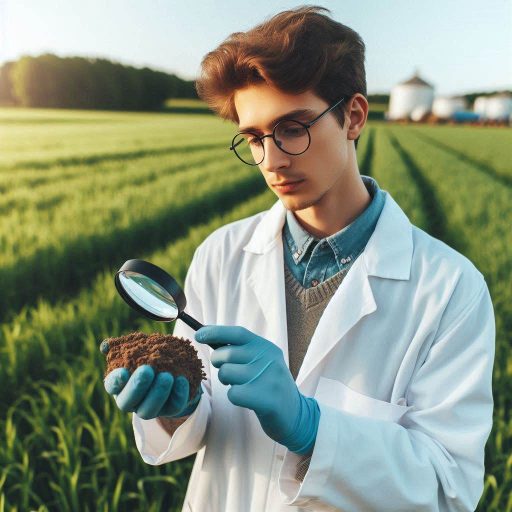Introduction
Soil scientist internship and training programs provide valuable opportunities for students and early-career professionals.
These programs bridge the gap between academic knowledge and practical experience.
Internships often take place in research institutions, government agencies, or agricultural companies.
They offer hands-on training in soil analysis, conservation practices, and environmental management.
Participating in internships is crucial for gaining practical experience in soil science.
Interns apply theoretical knowledge to real-world situations, enhancing their understanding of soil properties and management.
Working alongside experienced professionals fosters skill development and helps build confidence in the field.
Internship programs also facilitate networking opportunities.
Interns connect with industry professionals and fellow students, creating valuable relationships for future career prospects.
These connections can lead to job opportunities and mentorship in the field.
Additionally, internships enhance resumes and improve job market competitiveness.
Employers often prioritize candidates with practical experience, making internships a valuable asset.
Participants gain insights into industry trends and best practices, enriching their education.
Soil scientist internship and training programs play a vital role in professional development.
They provide hands-on experience, networking opportunities, and skills that enhance employability.
Engaging in these programs prepares individuals for successful careers in soil science.
Overview of soil scientist internship programs
Purpose of Internship Programs for Soil Scientists
Internship programs serve multiple purposes for soil scientists.
They provide hands-on experience in various soil-related tasks.
Interns learn to conduct soil analyses, collect samples, and perform fieldwork.
This practical experience is essential for understanding complex soil processes and techniques.
Moreover, internships help students develop professional skills.
Interns enhance their communication, teamwork, and problem-solving abilities in real-world settings.
These skills are vital for successful careers in soil science and related fields.
Internships also offer networking opportunities.
Students connect with professionals in the industry, building valuable relationships.
These connections can lead to future job opportunities and collaborations.
Overall, internships are critical for personal and professional growth in soil science.
Types of Internship Opportunities for Aspiring Soil Scientists
Several types of internship opportunities exist for aspiring soil scientists.
Government agencies often offer internships focusing on soil conservation and management.
These positions may involve field surveys, data analysis, and reporting on soil health.
Non-profit organizations also provide internships related to environmental protection and sustainable agriculture.
Interns may work on projects promoting soil health, biodiversity, and ecosystem restoration.
These opportunities allow students to contribute to meaningful causes while gaining experience.
Academic institutions frequently offer research internships.
Students can assist professors and researchers in various soil science projects.
These internships involve laboratory work, data collection, and analysis, enhancing students’ research skills.
Private companies involved in agriculture, environmental consulting, and land management also offer internships.
Students can gain practical experience in soil testing, assessment, and management practices.
Working in private industry provides insights into commercial applications of soil science.
Where to Find Internship Programs in the Field
Finding internship programs in soil science requires proactive research.
Start by exploring university career services.
Many institutions maintain databases of internship opportunities related to environmental sciences and agriculture.
Professional organizations, such as the Soil Science Society of America (SSSA), also provide resources.
They often list internship openings and networking events for students and early-career professionals.
Joining these organizations can offer access to exclusive internship postings.
Online job boards and internship websites are valuable resources.
Websites like Indeed, Glassdoor, and LinkedIn frequently list internships in soil science.
Utilize search filters to narrow down opportunities related to soil research and environmental science.
Additionally, contacting local agricultural extension offices can yield internship leads.
These offices often collaborate with universities and offer practical training programs.
Reaching out directly to companies in the soil science field can also uncover hidden internship opportunities.
Internship programs are vital for aspiring soil scientists, providing essential hands-on experience and professional development.
Various internship opportunities exist within government agencies, non-profits, academic institutions, and private companies.
To find these programs, students can leverage university career services, professional organizations, job boards, and local agricultural offices.
Engaging in internships allows future soil scientists to build skills, gain experience, and create valuable connections in the field.
These opportunities lay a strong foundation for successful careers in soil science and related disciplines.
Read: U.S. Cities with the Most Opportunities for Environmental Scientists
Requirements for Soil Scientist Internship Programs
Educational Background and Skills Needed to Qualify for an Internship
To qualify for a soil scientist internship, candidates typically need a relevant educational background.
Most internships require at least a bachelor’s degree in soil science, environmental science, or a related field.
Some positions may also accept candidates with degrees in agriculture, geology, or biology.
In addition to a strong academic background, candidates should possess specific skills.
Analytical skills are crucial for analyzing soil samples and interpreting data.
Attention to detail is vital when conducting experiments and documenting findings.
Candidates should also have strong communication skills for reporting results and collaborating with team members.
Technical skills, such as proficiency in laboratory techniques and soil testing methods, are beneficial.
Familiarity with Geographic Information Systems (GIS) can enhance a candidate’s profile.
Understanding soil conservation practices and regulations will also set candidates apart.
Additional Requirements Such as GPA, References, or Previous Experience
In addition to educational qualifications, many internships have additional requirements.
A minimum GPA requirement is common, often set at 3.0 or higher on a 4.0 scale.
Strong academic performance demonstrates a candidate’s commitment and ability to succeed in the field.
References from professors or industry professionals may also be required.
Candidates should build relationships with faculty members who can provide positive recommendations.
Previous experience in related positions, such as volunteer work or part-time jobs, can strengthen an application.
Some internships may require candidates to complete specific coursework before applying.
Relevant courses in soil chemistry, microbiology, and environmental science are beneficial.
Candidates should check the internship’s specific requirements to ensure they meet all criteria.
Tips on How to Strengthen an Application for a Soil Scientist Internship
Strengthening an application for a soil scientist internship involves several strategies.
First, candidates should tailor their resumes and cover letters to highlight relevant experiences.
They should emphasize academic achievements, relevant coursework, and any hands-on experience.
Networking can also play a crucial role in securing an internship.
Candidates should attend industry conferences, seminars, and workshops to connect with professionals.
Joining student organizations related to soil science can provide valuable networking opportunities and resources.
Additionally, candidates should consider gaining experience through volunteering or part-time work.
Participating in community projects related to soil conservation or environmental research demonstrates commitment.
These experiences can enhance a resume and provide real-world insights.
Candidates should also prepare thoroughly for interviews.
Researching the organization and its projects can help candidates answer questions confidently.
Practicing common interview questions and preparing thoughtful questions for interviewers will demonstrate genuine interest.
Soil scientist internships offer valuable training for aspiring professionals.
Candidates need a relevant educational background, strong skills, and a commitment to the field.
Meeting GPA and reference requirements and gaining related experience will strengthen applications.
By following these tips, aspiring soil scientists can improve their chances of securing a rewarding internship.
These experiences will provide essential skills and knowledge for future careers in soil science.
Read: Environmental Scientist vs. Ecologist: Roles and Differences in the US

Benefits of participating in Soil Scientist Internship programs
Hands-On Experience Gained Through Internships
Internships offer essential hands-on experience that classroom learning alone cannot provide.
Interns work directly with soil samples and data collection techniques.
This experience deepens their understanding of soil properties, testing methods, and analysis.
Interns participate in fieldwork, allowing them to gather real-world data.
They learn how to sample soil accurately and measure various properties.
This practical exposure equips them with the necessary skills to conduct soil assessments.
Additionally, internships often involve laboratory work, where interns analyze soil samples.
They become familiar with laboratory equipment and procedures, gaining technical skills crucial for their future careers.
Understanding how to operate and maintain equipment is vital for soil scientists.
Interns also observe experienced professionals, learning best practices in the field.
This mentorship provides insights into the daily responsibilities of soil scientists.
Interns gain a realistic view of what their future roles may entail.
Developing Important Skills in Soil Science
Internships help develop critical skills essential for success in soil science.
Interns learn to interpret data effectively, a skill vital for analyzing soil characteristics.
They practice using various software tools for data management and analysis.
Communication skills also improve during internships.
Interns often present their findings to supervisors and colleagues, enhancing their ability to convey complex information clearly.
Strong communication skills are essential for collaborating with teams and stakeholders.
Problem-solving abilities grow as interns encounter real-world challenges.
They learn to develop solutions for issues like soil contamination or erosion.
This experience fosters adaptability, a key trait in scientific research.
Interns also develop organizational skills by managing projects and timelines.
Balancing multiple tasks in a fast-paced environment prepares them for future job demands.
This ability to prioritize tasks and meet deadlines is crucial in professional settings.
Networking and Career Advancement Opportunities
Internships provide excellent networking opportunities that can enhance career advancement.
Interns connect with professionals in the soil science field, building relationships that may lead to future job opportunities.
These connections are invaluable when seeking recommendations or job openings.
Participating in internship programs allows interns to meet industry leaders and attend conferences.
Engaging in discussions with experts can open doors to collaborations and further learning.
Networking with peers in the program also creates a supportive community for future endeavors.
Furthermore, many internships lead to full-time job offers upon completion.
Employers often hire interns who demonstrate strong performance and a good cultural fit.
This pathway to employment highlights the importance of making a positive impression during internships.
Even if an internship does not lead directly to a job, the experience enhances a resume.
Employers value practical experience, making candidates more competitive in the job market.
Internships in soil science offer hands-on experience, skill development, and networking opportunities.
Interns gain practical knowledge through fieldwork and laboratory experiences.
They develop essential skills, including data interpretation, communication, and problem-solving.
Additionally, internships create valuable connections that can lead to career advancement.
Ultimately, these programs play a vital role in shaping the future of aspiring soil scientists, equipping them with the tools they need to succeed in their careers.
Read: The Relationship Between U.S. Policy & Environmental Scientist Roles
Training programs for aspiring soil scientists
Types of Training Programs Available for Soil Science
Training programs in soil science vary widely, catering to different career paths and interests.
Certificate programs offer focused, short-term training for specific skills in soil management and analysis.
These programs often require a few months of study and can be an excellent entry point for aspiring soil scientists.
Associate degree programs provide a more comprehensive introduction to soil science.
These two-year programs typically cover fundamental concepts and techniques.
Students gain knowledge in soil chemistry, physics, and biology, alongside practical lab experience.
Bachelor’s degree programs delve deeper into the science of soils and their importance to ecosystems.
Students learn about soil formation, classification, and management practices.
Coursework often includes fieldwork, allowing students to apply their knowledge in real-world settings.
Graduate programs, such as master’s and doctoral degrees, focus on advanced research and specialized areas of soil science.
Graduate students engage in in-depth research projects, contributing to new knowledge in the field.
These programs typically require a thesis or dissertation, demonstrating a high level of expertise.
Academic Institutions and Organizations Offering Training Programs
Several academic institutions and organizations provide training programs in soil science.
Land-grant universities are known for their agricultural programs, including soil science.
Institutions like the University of California, Davis, and Texas A&M University offer undergraduate and graduate programs in soil science.
Additionally, many community colleges provide associate degree and certificate programs in agricultural sciences.
These programs focus on practical skills relevant to soil management and environmental conservation.
Community colleges often collaborate with local agricultural organizations to offer hands-on training opportunities.
Professional organizations also contribute to soil science training.
The Soil Science Society of America (SSSA) offers workshops, webinars, and certification programs.
These resources help professionals stay current with advancements in the field.
Practical Skills and Knowledge Gained Through Training Programs
Training programs in soil science equip students with valuable practical skills.
Students learn to conduct soil tests, assess soil health, and analyze soil samples in laboratories.
Mastery of these techniques is crucial for making informed decisions in agricultural practices and environmental management.
Fieldwork is a significant component of many training programs.
Students gain hands-on experience by collecting soil samples, conducting surveys, and assessing land use.
This practical experience helps students develop essential problem-solving skills and the ability to work in diverse environments.
Moreover, training programs foster critical thinking and research skills.
Students learn to design experiments, analyze data, and interpret results.
These skills are vital for pursuing careers in research, consulting, and policy-making related to soil management.
Finally, networking opportunities during training programs can lead to internships and job placements.
Students connect with professionals in the field, gaining insights into potential career paths.
These connections are invaluable as they transition from education to the workforce.
In summary, soil science training programs provide a robust foundation for aspiring soil scientists.
Various options are available, from certificates to advanced degrees, catering to diverse interests.
Academic institutions and professional organizations play vital roles in delivering these programs.
Through training, students acquire essential practical skills and knowledge, preparing them for rewarding careers in soil science.
As the demand for soil scientists continues to grow, these programs remain crucial for nurturing the next generation of experts.
Read: Organizations & Associations for Environmental Scientists in the USA
Importance of Mentorship in Soil Scientist Internships
The Role of Mentorship in Professional Development
Mentorship is crucial for interns navigating the complexities of soil science.
A mentor provides guidance, shares experiences, and offers valuable insights into the field.
This relationship can help interns develop skills and understand industry expectations.
Mentors can introduce interns to essential resources and networks.
They often share their professional connections, helping interns expand their networks.
This access can lead to future job opportunities and collaborations in soil science.
Additionally, mentors can help interns set realistic career goals.
They offer feedback on performance, helping interns identify strengths and areas for improvement.
This constructive criticism is vital for personal and professional growth.
Mentorship also fosters confidence in interns.
When mentors support their mentees, it encourages them to take on new challenges.
This confidence is crucial for pursuing advanced positions in soil science.
Benefits of Having a Mentor in Soil Science
Having a mentor in soil science provides numerous benefits.
First, mentors can help interns navigate complex topics and research methods.
They can clarify challenging concepts and provide resources for further learning.
Second, mentors serve as role models.
Interns can observe their mentors’ work ethic, professionalism, and problem-solving skills.
This observation inspires interns to emulate these qualities in their careers.
Moreover, mentors can facilitate internships and job placements.
Many mentors have industry contacts, which can lead to job opportunities.
This assistance is invaluable for interns seeking to enter the job market after their training.
Mentors also help interns stay current with industry trends.
They can share information about emerging technologies and research developments.
This knowledge keeps interns informed and competitive in the evolving field of soil science.
Tips for Finding a Mentor in Soil Science
Finding a mentor in soil science requires intentional effort.
First, consider reaching out to professors or instructors in your program.
They often have extensive networks and can connect you with industry professionals.
Second, attend conferences and workshops related to soil science.
These events provide opportunities to meet experts in the field.
Approach speakers and participants, expressing your interest in mentorship.
Networking through professional organizations is another effective strategy.
Join associations related to soil science, such as the Soil Science Society of America.
Engage in their events and activities to meet potential mentors.
Additionally, utilize social media platforms like LinkedIn.
Create a professional profile highlighting your interests in soil science.
Connect with professionals in the field and express your desire for mentorship.
Finally, be proactive in initiating conversations.
When you identify someone you admire, reach out to them.
Explain your interest in their work and ask if they would consider mentoring you.
Internships in soil science are valuable for professional growth, and mentorship plays a vital role in this process.
Having a mentor helps interns navigate challenges, gain insights, and build confidence.
Mentors provide guidance, resources, and networking opportunities, enhancing career prospects.
By actively seeking mentorship through various channels, interns can significantly enhance their training experience.
This investment in mentorship will pay dividends as they advance in their careers in soil science.
Transform Your Career Today
Unlock a personalized career strategy that drives real results. Get tailored advice and a roadmap designed just for you.
Start NowConclusion
Internships and training programs play a vital role in shaping aspiring soil scientists.
These opportunities provide hands-on experience and practical skills essential for success in the field.
Participating in internships allows students to apply classroom knowledge to real-world situations, enhancing their understanding of soil science.
Key points highlighted in this blog include the variety of available internships.
Students can find opportunities in agricultural research, environmental consulting, and government agencies.
These experiences expose interns to diverse aspects of soil science and help them build professional networks.
Training programs often accompany internships, offering specialized workshops and seminars.
These programs equip aspiring soil scientists with valuable techniques, including soil analysis and data interpretation.
For those passionate about soil science, seeking out internships and training opportunities is crucial.
These experiences not only strengthen your resume but also deepen your understanding of the field.
Engaging with experienced professionals provides insights into career paths and industry trends.
Aspiring soil scientists should actively pursue these opportunities.
By investing time in internships and training, you can significantly enhance your career prospects in soil science.
Your dedication will lead to meaningful contributions to agriculture and environmental sustainability.




